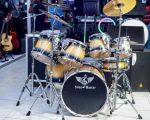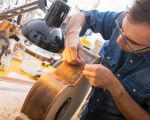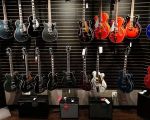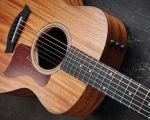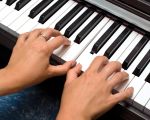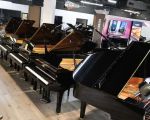Top-Rated Electric Pianos for Home Studios: Finding the Perfect Fit for Your Musical Needs
As someone who has spent a lot of time in a home studio, I can tell you that choosing the right electric piano is a game-changer. Whether you're a professional musician or just starting, having a quality instrument can elevate your music production. After experimenting with different models, I've learned a lot about what makes an electric piano stand out. In this article, I’ll share my personal experience with some of the best electric pianos for home studios that I’ve come across, and guide you through the factors to consider when choosing the perfect one for your needs.
1. Why You Need a Great Electric Piano in Your Home Studio
In any home studio, the right equipment can make a huge difference in the final sound. An electric piano offers versatility and convenience that acoustic pianos simply can’t match. For one, they’re much more compact, allowing you to save space while still enjoying a rich, full sound. But what really sets them apart is their ability to produce a wide range of sounds, from traditional piano tones to more experimental, synth-like sounds. This is especially useful for modern music production, where blending different genres is key.
One of the biggest benefits of an electric piano is the ability to connect to your recording setup. With USB and MIDI capabilities, you can easily integrate your electric piano with a digital audio workstation (DAW). This means that you can record, edit, and manipulate your piano performances without needing to mic up an acoustic piano. Plus, many models come with built-in effects and learning tools, which is great for both beginners and seasoned musicians.
2. Factors to Consider When Choosing an Electric Piano for Your Studio
Before diving into specific models, it’s important to understand the key features you should be looking for in an electric piano for your home studio. Here are some things to keep in mind:
- Key Action: The feel of the keys is crucial. If you’re used to playing on an acoustic piano, you’ll want a digital piano with weighted keys that mimic the feel of an acoustic instrument.
- Sound Quality: The sound is everything. Make sure the piano has high-quality samples, with a wide range of tones and effects.
- MIDI and Connectivity: MIDI connectivity allows for easy integration with your DAW, so you can record and edit your music seamlessly.
- Portability: If you’re tight on space or plan to travel with your piano, look for a model that is lightweight and easy to transport.
- Price: The price of electric pianos can vary significantly. While you can find budget-friendly options, keep in mind that higher-end models often provide better sound quality and more features.
3. Best Electric Pianos for Home Studios: My Top Picks
Now that you know what to look for, here are a few models that I highly recommend for any home studio. Each one has been carefully selected for its sound quality, key action, and overall value:
Yamaha P-125
The Yamaha P-125 is one of my personal favorites. It offers an authentic piano feel with its Graded Hammer Standard (GHS) action, which replicates the feel of an acoustic piano. The sound quality is fantastic, thanks to Yamaha’s Pure CF Sound Engine, which uses samples from their renowned CFIIIS concert grand piano. It’s also relatively affordable for the features it offers, making it an excellent choice for both beginners and more advanced musicians.
What I love most about the P-125 is how easy it is to integrate with your recording setup. It includes USB-to-host connectivity, allowing you to easily connect to a computer or DAW. Plus, the 192-note polyphony ensures that your playing will never cut out, even during complex compositions.
Roland FP-30X
If you're looking for a more professional-level piano, the Roland FP-30X is another top contender. This model offers incredible sound quality, thanks to Roland's SuperNATURAL piano engine, which provides a rich, full sound with exceptional expression. The key action is incredibly responsive, and the PHA-4 Standard action feels remarkably close to an acoustic piano.
In addition to excellent sound, the FP-30X offers extensive connectivity options, including Bluetooth for wirelessly connecting to apps, and a USB port for direct connection to your DAW. The modern design and lightweight frame make it easy to fit into any studio space, making it perfect for home studio setups where space is at a premium.
Korg B2
If you're on a budget but still want a solid electric piano, the Korg B2 is a fantastic option. It features a natural weighted hammer action, which gives you a traditional piano feel without the hefty price tag. The sound quality is surprisingly good, with a wide variety of sounds, including electric pianos and organs, in addition to traditional grand piano tones.
The Korg B2 is straightforward to use and integrates well with DAWs via USB MIDI. While it doesn't have as many features as some of the higher-end models, it’s perfect for anyone who needs a simple, reliable electric piano for their home studio.
4. Additional Tips for Setting Up Your Home Studio
Once you’ve chosen the best electric piano for your needs, it’s important to set up your home studio correctly to get the most out of your instrument. Here are a few tips:
- Acoustic Treatment: To get the best sound quality from your electric piano, consider adding some acoustic treatment to your room. This will help minimize unwanted reflections and create a more controlled environment for recording.
- Quality Headphones: Invest in a good pair of headphones for practice and recording. This will allow you to hear the full range of sounds your piano can produce, especially when using headphones for quiet practice.
- Desk and Stand: A solid desk or stand is essential for stability. Ensure that your piano is positioned at a comfortable height to avoid strain during long sessions.
5. Final Thoughts on Choosing the Best Electric Piano for Your Studio
In my experience, choosing the right electric piano for your home studio is all about balancing sound quality, key action, and functionality. Whether you’re looking for a budget-friendly option like the Korg B2 or a more professional model like the Roland FP-30X, there’s something out there for every musician.
Remember, the best piano for you depends on your personal needs and preferences. If you prioritize portability and ease of use, models like the Yamaha P-125 or Korg B2 are great choices. But if you're looking for something that offers top-tier sound and advanced features, the Roland FP-30X will certainly meet your needs.
Whatever you choose, a good electric piano can transform your home studio and bring your music to life. Happy playing!

